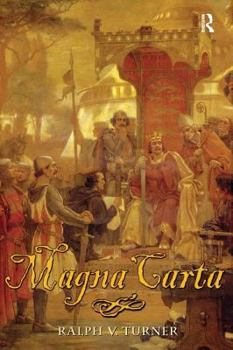Magna Carta
Select Format
Select Condition 
Book Overview
Magna Carta holds a special place in the popular imagination of the English. This, the first major book to explore the great political vision that lay behind it, uncovers the mystery of its origins, and charts its enduring relevance through the centuries.
Format:Paperback
Language:English
ISBN:0582438268
ISBN13:9780582438262
Release Date:September 2003
Publisher:Routledge
Length:282 Pages
Weight:1.30 lbs.
Dimensions:0.8" x 6.5" x 9.4"
Related Subjects
Constitutions England Europe History Ireland Political Science Politics & GovernmentCustomer Reviews
1 rating
Turner on Magna Carta: Not Unbiased but Nonetheless Useful
Published by Thriftbooks.com User , 21 years ago
Ralph Turner's book is a welcome addition to the abundant literature on Magna Carta - welcome because it takes advantage of the latest knowledge of, and research on, the Great Charter. On the other hand, Mr. Turner has an obvious bias in favor of the unwashed masses and the latest fashions in post-modern moral relativism, perhaps owing to his substitution of these fashions for a previous Marxist bent. For example, he celebrates without reservation the recent U.S. Supreme Court decision in Lawrence v. Texax that held that no State may criminalize homosexual conduct - despite the age-old legal tradition that, as Blackstone said in his great work Commentaries on the Laws of England, such conduct constituted the "infamous crime against nature." Another defect in the book is its use of tertiary sources that refer to secondary sources that don't refer back to original sources. To understand the context of these sources and what these sources really are, the reader must have a wide-ranging background in the first place. On the other hand, Mr. Turner gives a good, highly readable historical account and perspective not only on the events surrounding the 1215 Charter but also on subsequent consequent events such as the 1628 Petition of Right and the 1688 English Bill of Rights. This information is important for both British readers and American readers: the Founders of the American Constitution labelled these three documents - Magna Carta (1215), Petition of Right (1628), and English Bill of Rights (1689) - as "the bible of English liberty." Moreover, they copied or paraphrased many of the provisions of these three documents and incorporated them into the American Constitution (ratified 1789) and Bill of Rights (ratified 1791). Among these provisions are the right to petition the government for redress of grievances, the right to have ordinary personal arms, restrictions on quartering soldiers, due process of law, habeas corpus, trial by jury, speedy trial, and a ban on cruel and unusual punishments. All in all, Mr. Turner's book is a good read: even a serious high-school student can benefit from reading it.






